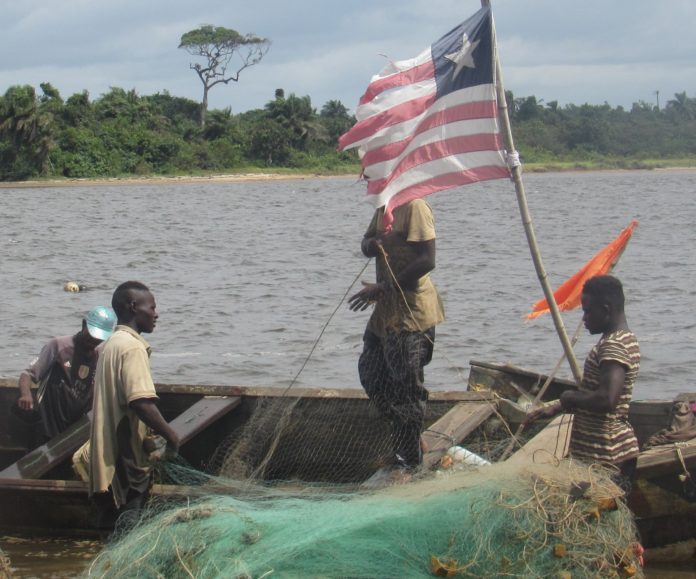In spite of the huge economic potential of Liberia’s Fisheries sector, it is said to be lacking behind in terms of infrastructure such as designed fishing port and post-harvest facilities to enhance the capacities of Industrial and Artisanal fishers in a more sustainable and safer fashion to increase catch for economic growth.
Unlike, the industrial vessels that carry on board more crewmembers and demonstrate some level of sophistication, the indigenous Kru Canoe holds a maximum of three crewmembers using oars to navigate. However, in the artisanal sector Fanti canoe that was replicated from Ghana carries 15 crew on board and is powered by 25-45 horsepower (HP) engines.
Our investigation shows that fishers using Kru canoe mainly use hook with long lines and gillnets to conduct their fishing activity. Fanti canoe use ring and purse nets for small pelagic species, which account for 40-percent of artisanal fishing in Liberia.
In 2016, the National Fisheries and Aquaculture Authority (NaFAA) was enacted into law by the Legislature replacing the National Fisheries Bureau, a unit of the Ministry of Agriculture, as the entity with the responsibility to coordinate and monitor the fishery sector as well as ensure conducive working environment for men and women working in the sector.
NaFAA also focuses on safety through the provision of safety gears to the fishing community, ensure the preservation of catch through creation of cooling storage facilities, among others.
In the face of the establishment of NaFAA, the Chief Liberian Fisherman in Marshall, a city 55 km South East of Monrovia in Lower Margibi County, Rev. Emmanuel Howard has decried the bad working condition of fishermen and fishmongers in the fishing town and called for the urgent intervention of the Fisheries Agency.
Rev. Howard said Marshall as a major and old fishing community is seriously underdeveloped and that the working environment for them is extremely appealing.
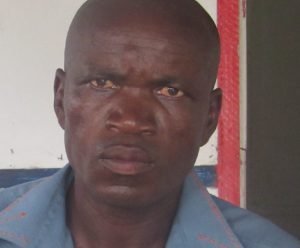
“As artisanal Liberian fishermen we are subjected to use the Kru Canoe without safety gears to conduct our fishing activity on deep sea due to the lack of financial and logistical supports even though we continue to pay our taxes to NaFAA”, he said.
NaFAA, Rev. Howard added, intervened by organizing them into a unit of Cooperative, but support is not forthcoming as expected to build the capacity of members to improve their wellbeing.
“All of the commitments made by NaFAA are yet to be realized, including the provision of dryers in the absence of cool storage, to preserve left over fishes.”
“I think it now time for men and women working in the artisanal fishing sector to have better environment to work and this can only be done with the intervention of NaFAA,” Rev. Howard further explained.
A Ghanaian Artisanal fisherman from Ghana operating in the fishing town of Marshall, Shankar Kofi averred that one of the major threatening problems confronting the fishing community in Liberia is the lack of safety jacket and floater in case of accident at sea.
Mr. Kofi said currently fishermen and women operating at the Marshall fishing point are operating at the mercy of God in case of any disaster.
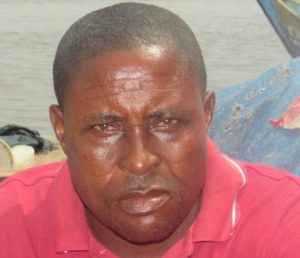
“The entire fishing community in term of work is seriously poor and life threatening because the rightful safety gears are lacking”, Kofi explained.
High annual license fees
Despite of the poor working conditions and lack of technical support from the government of Liberia, fishermen also complained of high cost of annual license fees.
This, Kofi added is a serious obstacle to their operations amid difficult business climate.
“In fact, what is mostly discouraging is that NaFAA has heavily increased taxes on the various categories of fishing canoes for we who are working in the artisanal fishing sector.”
“Small indigenous Kru canoes license fee remains LRD 3,200 (USD 21) annually but canoe measuring between 1-15hp which we were first paying LRD 2,500 (USD 16) has now been increased to USD 250. We who are operating the big Fanti canoe powered by 15-40hp engine were paying LRD 5,000 but now we are being made to pay a fee of USD 475”, he said.
“There is a declined in our catch because we don’t conduct fishing activity during the rainy season. We are only fishing in the dry season. With all those challenges, still the government through NaFAA imposed this high taxation on us”.
Kofi explains they are not making money from fishing because they don’t have storage or dryer to preserve the catches.
“There is no valued change in term of proper market for us to sell our fish after fishing; we only rely on fishmongers that comprised mostly women to buy from us.” He explains some women don’t have enough money to buy, so they give them the fish and they pay back once they have sold it, a process they call “sell pay”.
A female fishmonger in Marshall, Dorcas Weah agreed with Kofi and said she lost her small hp engine that was powering her canoe at sea. “The canoe had an accident due to the rough sea and my engine fell in the water up to now we were not able to retrieve it”.
“We are trying to support ourselves as women but we don’t have the money to get safety materials that will help us to carry on our work”, she indicated.
Dorcas Weah explains that women do not go fishing at sea: “We only support the men and we get the fish from them since we don’t have cool storage we use our mud dryer to dry our fishes selling to our friends that come from far or near to buy for various markets”.
“This method of preserving our fishes is labor intensive for we the women so we just appealing to NaFAA to try to help us by creating cool storage to us”.
Transforming rotten fish to eatable product
Fish harvested from many fishermen in several fishing communities in Liberia continues to get spoiled due to the lack of storage facility for fishmongers.
However, hope seems not to be lost as some are processing rotten fish into consumable product despite difficulties and hazardous condition for the fishing communities.
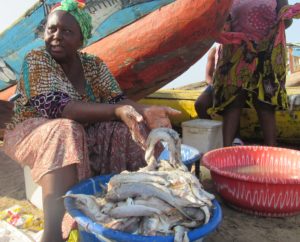
“For me I am engaged in buying rotten fish from fisherman and process them into Muo-muo”, said Weedor Dedeh a fishmonger from the fishing community of West Point in Monrovia said.
“The rotten fish is commonly called Muo-muo in Liberia. We prepare it by adding a huge quantity of salt to the rotten fish, dry the fish in the sun and later take it to the market for sale,” Madam Dedeh said.
She explains that Muo-muo price varies from fishing point to fishing point. “But what I want to say is that we want a place to store our fish so it can’t spoil like the way it’s happening now,” she concludes.
Mr.James Tugbah, a fisherman from West Point in Monrovia, expressed dismay that NaFAA, which should be helping to transform the fishery sector, has failed so far to improve their working conditions.
“There is no help from NaFAA, its only interest is to increase the taxes on our activities. We the fishermen are really suffering because when we catch our fish we don’t get anywhere to store them so we end up selling our fish at any cost to the buyers”, Tugbah added.
“We are paying our taxes but we are not getting any benefit from NaFAA”, he added.
However, Tugbah is appealing to government to help them solve the problem of storage and working gears to make their work effective and safe.
The President of the Liberia Artisanal Fishmen Association (LAFA) Jerry Blamo confirmed the lack of safety materials and the increase in registration fees by NaFAA.
“We lack logistical and funding to enhance our operations to the 120-fishing communities along the Coastal lines”.
“We have being talking with NaFAA to try to secure some safety materials like live jets, floaters, GPRS to carry on our work, but in the absence of this we the Artisanal Fishmen will continue to be unsafe”
“LAFA is working with the Fishery Authority to establish Cooperative in fishing Communities so that any help coming to the fishing community can be done through those cooperatives”,Mr. Blamo said.
“LAFA is in total disagreement with the decision of NaFAA to grant Industrial Fishing Companies the rights to operate in the six nautical mile that should be reserved for we the Artisanal Fishmen”,He explains.
“LAFA will resist any attempts to give out the Six Nautical Mile to the big industrial company because we the Artisanal Fishmen need to fish too”, Mr. Blamo argued
“We have 33,000 fisher folks and 114 landing sites so we must be given the rights to only operate within the six nautical mile”the LAFA Boss said.
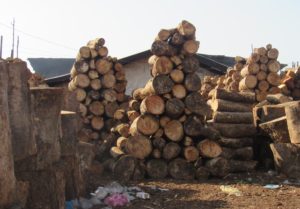
“The working relationship between LAFA and NaFAA is good unless the disagreement about the status of six nautical mile must be granted us”. He said.
“NAFAA attempted to give out the six nautical mile to a Senegalese Industrial Fishing Company and we said no because that action would have affected us”
“Imagine we don’t know single storage in Liberia so fishes that get spoil from us are buried”,Mr. Bloma indicated.

“NaFAA has made commitment to secure motorize engines and fishing nets for the various cooperatives”, He said
NaFAA promises to initiate programs
In response to complaints by fishermen regarding the lack support, NaFAA Deputy Director General for Technical Services, Mr. William Y. Boeh, said “we have updated NaFAA 2010 regulations and we are now waiting on the Foreign Ministry to print it into a hand bill.”
Mr. Boeh said this will pave the way for NaFAA to initiate programs that will create better working environment for fishers including the creation of post-harvest facilities in key fishing communities to ensure that fishers and fishmongers can preserve their catches in a much more systematic way.
“We are working alongside with our partners including the Food and Agriculture Organization of the United Nations, European Union among others to strengthen the capacity of fishermen, fishmongers and the safeguard.”
According to Mr. Boeh, phase-1 of the training has been completed in some fishing communities including Grand Cape Mount, Marshall, Montserrado and Bomi Counties.
“The training was conducted by the Cooperative Development Agency (CDA) following a Memorandum of Understand entered into by CDA and NaFAA”, Mr. Boeh said.
The NAFAA official said with support from International Partners the entity is currently working on plans to initiate a new preservation method that will enable fishermen and fishmongers to store their fishes in the safer way.
Mr. Boeh admitted that the issue of safety gears is a major challenged in the sector but promised that NaFAA is working hard with partners to bring into the Country safety gears in the next six months.
“NaFAA has secured some motorized engines from Japan and the institution is preparing to give those engines to professional fisheries organizations to facilitate their work and ensure a safe working environment.”
“We are very concerned about the current state of the fishing sector and this is why NaFAA is doing everything to change the narrative by instituting program and policy to create an enabling environment for fishers and fishmongers.”
Annually, the artisanal fishing sector produce 13 metric ton of fish while domestic production counts for 6,000 metric ton” Mr. Boeh added.
About 17 foreign fishing vessels from several countries around the world are currently registered by fishery authorities to operate in Liberian’s Economic Exclusive Zone (EEZ). Liberia currently has almost 9 fishing communities located in coastal areas.
This article was funded by the Network of Journalists for Responsible Fishing in Africa (REJOPRA).
The funder has no decision on the content of this article.














